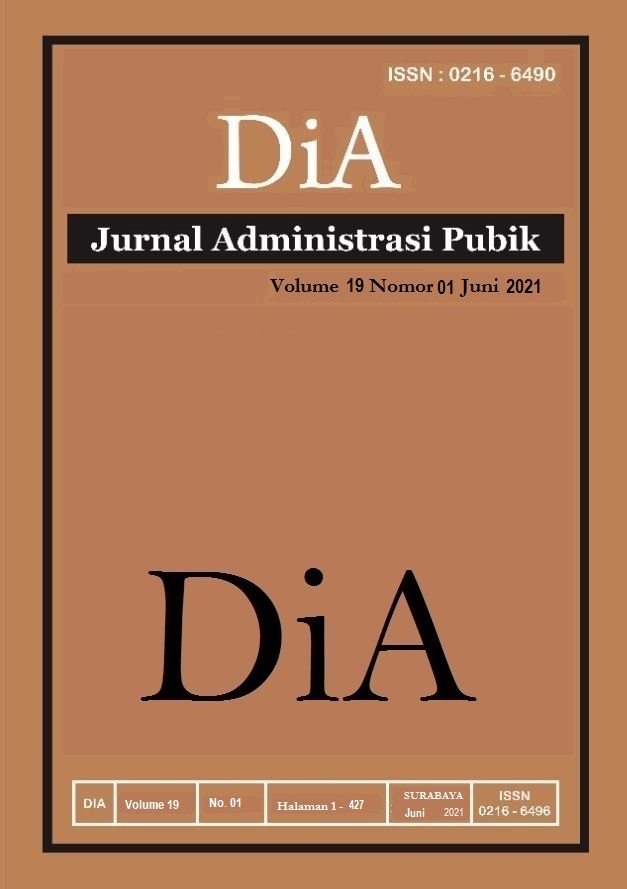LOCAL GOVERNMENT INNOVATIONS IN THE COVID-19 PANDEMIC: Public Perceptions of the Implementation of the Behambinan Local e-Commerce Application in Samarinda City
DOI:
https://doi.org/10.30996/dia.v19i1.5094Keywords:
Development Prospects, Smart City, SWOT AnalysisAbstract
In this study, the authors looked at local government innovations that focused on the Samarinda City Government in the midst of the Covid-19 pandemic. The focus of this research is on people's perceptions of local e-commerce applications which are the innovations of the Samarinda City Government in Handling Covid-19. This research is qualitative research using a qualitative descriptive approach. The data used in this study are premiere data obtained through online surveys and the play.google.com website as support. In addition, the author also made observations on the Behambinan application to obtain more in-depth data. The results showed that only 24 percent of respondents knew about the Behambinan e-commerce application. This is because the socialization carried out by the Samarinda City Government is not optimal. The lack of socialization affects people to prefer e-commerce that is familiar in society. In addition, the local e-commerce application Behambinan is not only used as innovation during a pandemic, but its realization must touch and have an impact on society.
Downloads
References
Akib, H. (2010). IMPLEMENTASI KEBIJAKAN: Apa, Mengapa, dan Bagaimana. Jurnal Administrasi Publik, 1(1), 1–11.
Bunardi, B., Naga, D. S., & Arisandi, D. (2019). Pengembangan Aplikasi E-Commerce Produk Lokal Dan Data Kependudukan Pada Desa Giritengah, Borobudur. Computatio : Journal of Computer Science and Information Systems, 3(1), 77. https://doi.org/10.24912/computatio.v3i1.4274
Dian Herdiana. (2018). Sosialisasi Kebijakan Publik: Pengertian dan Konsep Dasar. Jurnal Ilmiah Wawasan Insan Akademik, I(November 2018), 13–26.
Firmansyah, A. (2018). Kajian Kendala Implementasi E-Commerce Di Indonesia. Masyarakat Telematika Dan Informasi : Jurnal Penelitian Teknologi Informasi Dan Komunikasi, 8(2), 127. https://doi.org/10.17933/mti.v8i2.107
Haidir, A. (2020). Aplikasi Behambinan Terus Dikembangkan, Solusi Berjualan di Masa Pandemi Covid-19. PPID KOTA SAMARINDA. Retrieved from https://ppid.samarindakota.go.id/berita/kabar-pemerintahan/aplikasi-behambinan-solusi-belanja-buka-puasa-cukup-lewat-smartphone
Hallahan, K., Holtzhausen, D., Ruler, B. van, Vercic, D., & Sriramesh, K. (2007). Defining Strategic Communication. International Journal of Strategic Communication, 1(1), 3–35. https://doi.org/10.1080/1553118X.2012.678523
Hidayat, S., Suryantoro, H., & Wiratama, J. (2017). PENGARUH MEDIA SOSIAL FACEBOOK TERHADAP PERKEMBANGAN E – COMMERCE DI INDONESIA. Jurnal SIMETRIS, 8(2), 415–420.
Jamaludin, F. (2020). Pandemi Buat Pengguna E-commerce Baru Tumbuh 12 Juta. Merdeka. Retrieved from https://www.merdeka.com/teknologi/pandemi-buat-pengguna-e-commerce-baru-tumbuh-12-juta.html
Julisar, & Miranda, E. (2013). Pemakaian E-Commerce Untuk Usaha Kecil Dan Menengah Guna Meningkatkan Daya Saing. ComTech, 4(2), 638–645.
Karja. (2020, April 16). Aplikasi Behambinan Hadir untuk Warga Samarinda sebagai Pengganti Pasar Ramadhan. Kumparan. Retrieved from https://kumparan.com/karjaid/aplikasi-behambinan-hadir-untuk-warga-samarinda-sebagai-pengganti-pasar-ramadan-1tEaSJOz7Z8
Katadata. (2020). Jumlah Pengguna Internet di Indonesia Capai 196,7 Juta. Katadata.Co.Id, (November), 2020. Retrieved from https://databoks.katadata.co.id/datapublish/2020/11/11/jumlah-pengguna-internet-di-indonesia-capai-1967-juta
Laudon, K. C., & Traver, C. G. (2016). E-commerce 2016: business. technology. society. In Global Edition. Retrieved from www.pearsonglobaleditions.com
Lukito, I. (2017). Tantangan Hukum dan Peran Pemerintah dalam Pembangunan E-Commerce (Legal Challenges and Government`S Role in E-Commerce Development). Pusat Pengkajian Dan Pengembangan Kebijakan Badan Penelitian Dan Pengembangan Hukum Dan HAM Kementerian Hukum Dan HAM R.I., 11(3), 349–367.
Manzoor, A. (2010). E-Commerce: An Introduction. USA: LAP LAMBERT Academic Publishing.
Rahmidani, R. (2015). Penggunaan E-Commerce Dalam Bisnis Sebagai Sumber Keunggulan Bersaing Perusahaan. Prosiding Seminar Nasional Ekonomi Manajemen Dan Akutansi (SNEMA), 345–352.
Riduan, M. (2020). Aplikasi Behambinan Buatan Anak Samarinda Masih Digunakan, Bantu UMKM di Masa Pandemi - Tribun Kaltim. Kaltim.Tribunnews.Com. Retrieved from https://kaltim.tribunnews.com/2020/08/25/aplikasi-behambinan-buatan-anak-samarinda-masih-digunakan-bantu-umkm-di-masa-pandemi
Rudolf, G., & Haindlmaier, G. (2010). SMART CITIES RANKING: AN EFFECTIVE INSTRUMENT FOR THE POSITIONING OF CITIES? 7–25.
Stahl, B. C. (2007). The paradigm of e-commerce in e-government and e-democracy. Developing Successful ICT Strategies: Competitive Advantages in a Global Knowledge-Driven Society, (January 2007), 281–296. https://doi.org/10.4018/978-1-59904-654-9.ch014
Sugiyono. (2016). Metode Penelitian Pendidikan Pendekatan kuantitatif, Kualitatif, dan R&D. Bandung: Alfabeta.
Widagdo, P. B. (2016). Perkembangan Electronic Commerce ( E-Commerce ) di Indonesia. Researchgate. Net, (December), 1–10.
Widodo, A., & Permatasari, D. A. (2020). Strategi Komunikasi dalam Program Bekasi Smart City. ETTISAL : Journal of Communication, 5(1). https://doi.org/10.21111/ejoc.v5i1.3454
Zulaikha, Z., & Paribrata, A. I. (2016). Implementasi Kebijakan Keterbukaan Informasi Publik di Jawa Timur Tahun 2016. Jurnal Studi Komunikasi (Indonesian Journal of Communications Studies), 2(1), 131–161.
Downloads
Published
How to Cite
Issue
Section
License
The DiA journal allows authors to retain the copyright of their papers without limitation. Authors may grant publishers non-exclusive publishing rights to publish articles. Granting first publishing rights to publishers also qualifies as unlimited copyright (because there are no restrictions imposed by publishers on author copyright).







